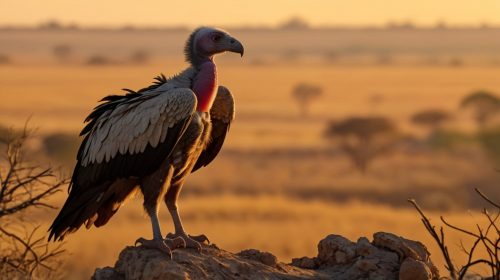
Here are some lesser-known and intriguing facts about vultures that highlight their uniqueness and importance in the natural world:
1. Thermoregulation Strategy:
– Vultures have a fascinating thermoregulation strategy. To regulate their body temperature, they often urinate on their legs. As the urine evaporates, it cools their blood vessels, helping them dissipate excess heat. This behavior is particularly useful in hot climates where vultures are frequently active.
2. Sense of Smell:
– Contrary to popular belief, many Old World vultures (found in Europe, Africa, and Asia) actually have a keen sense of smell. This ability allows them to locate carrion more efficiently, especially when vegetation or terrain obstructs their view.
3. Anti-Bacterial Properties:
– Vultures have specialized stomach acids that are exceptionally acidic, around pH 1 or lower. This acidity not only aids in digestion but also kills harmful bacteria present in decaying carcasses. This unique adaptation allows vultures to safely consume meat that would be toxic to other animals.
4. Intelligence and Problem-Solving Skills:
– Vultures exhibit surprising intelligence and problem-solving abilities. They have been observed using tools, such as stones, to break open eggs for food. This behavior demonstrates their adaptive intelligence in challenging environments.
5. Cultural and Symbolic Representations:
– In some cultures, vultures hold symbolic significance beyond their role as scavengers. For example, in ancient Egyptian mythology, the vulture was associated with the goddess Nekhbet, symbolizing protection and motherhood. In Hindu culture, the vulture is associated with the god Shani and represents purification and the cycle of life and death.
6. Unique Feeding Adaptations:
– Vultures have evolved various feeding adaptations that allow them to access and consume carrion efficiently. Some species, like the Egyptian Vulture, use stones to crack open eggs, while others have specialized beaks for tearing through tough animal hides and tendons.
7. Courtship Displays:
– Vultures engage in elaborate courtship displays to attract mates. These displays can include aerial acrobatics, ritualized dances on the ground, and vocalizations. Pair bonds are often maintained through mutual grooming and shared responsibilities in raising offspring.
8. Conservation Concerns and Efforts:
– Many vulture species are facing severe population declines due to habitat loss, poisoning from ingesting lead and pesticides, and collisions with human structures. Conservation efforts are crucial to protecting vultures and preserving their important ecological roles.
9. Longevity and Reproduction:
– Vultures are generally long-lived birds, with lifespans ranging from 20 to 30 years or more in the wild. They typically have low reproductive rates, often producing only one egg per breeding season. This makes them particularly vulnerable to population declines and habitat disturbances.
10. Scientific Research and Conservation Impact:
– Scientific research on vultures continues to uncover new insights into their behavior, ecology, and conservation needs. Conservation initiatives, such as captive breeding programs and habitat preservation efforts, are essential for ensuring the survival of vulture species around the world.
These lesser-known facts about vultures highlight their remarkable adaptations, cultural significance, and the challenges they face in the modern world. By raising awareness and supporting conservation efforts, we can work together to protect these important scavengers and maintain healthy ecosystems globally.
- More resources:
![]()